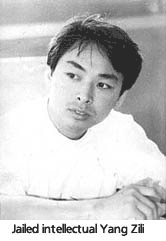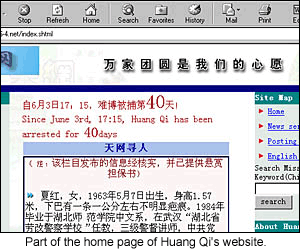
CPJ Condemns Subversion Charges Against Four Intellectuals
New York, May 23, 2001 — The Committee to Protect Journalists (CPJ) sent a letter today to Chinese president Jiang Zemin, condemning his government’s decision to bring subversion charges against four Beijing intellectuals who had used the Internet to publish articles and essays on politically controversial topics. Yang Zili, a writer and Web developer, Xu…
CPJ alarmed by move to restrict foreign broadcasters
New York, April 19, 2001 — The Committee to Protect Journalists (CPJ) is alarmed by the Singapore Parliament’s passage today of a bill designed to curb foreign broadcasters’ coverage of local issues. The new law, which gives the government broad power to restrict or suspend broadcasters for “engaging in domestic politics,” is expected to take…
2000 prison census: 81 journalists jailed
EIGHTY-ONE JOURNALISTS WERE IN PRISON AROUND THE WORLD at the end of 2000, jailed for practicing their profession. The number is down slightly from the previous year, when 87 were in jail, and represents a significant decline from 1998, when 118 journalists were imprisoned. While jailing journalists can be an effective means of stifling bad…
Attacks on the Press 2000: Asia Analysis
DESPITE PRESS FREEDOM ADVANCES ACROSS ASIA IN RECENT YEARS, totalitarian regimes in Burma, China, North Korea, Vietnam, and Laos maintained their stranglehold on the media. Even democratic Asian governments sometimes used authoritarian tactics to control the press, particularly when faced with internal conflict. Sri Lanka, for instance, imposed harsh censorship regulations during the year in…
Attacks on the Press 2000: Cambodia
WHILE CAMBODIA ENJOYS A SUBSTANTIALLY FREE PRINT MEDIA, local journalism continues to suffer from bitter political divisions and frequent clashes with government authorities. Press freedom is guaranteed by the Constitution, and the Khmer-language press is famous for taking dramatic liberties in print, often engaging in name-calling and attacks on various political leaders. Speaking to a…
Attacks on the Press 2000: Taiwan
TAIWAN’S FREEWHEELING MEDIA GENERALLY OPERATE with little interference from a government that presents itself as a model for democracy in the region. However, the young administration of President Chen Shui-bian and his Democratic Progressive Party (DPP) did suffer a few embarrassments arising from its treatment of (and by) the press. Chen narrowly won election in…
Attacks on the Press in 2000: Journalists in Prison
EIGHTY-ONE JOURNALISTS WERE IN PRISON AROUND THE WORLD at the end of 2000, jailed for practicing their profession. The number is down slightly from the previous year, when 87 were in jail, and represents a significant decline from 1998, when 118 journalists were imprisoned. While jailing journalists can be an effective means of stifling bad…
Internet publisher’s trial adjourned for health reasons
February 13, 2001—Internet publisher Huang Qi, whose Web site carried articles about human rights and political corruption, went on trial for subversion today in a closed courtroom in Chengdu, in the western province of Sichuan. Court officials told reporters that the trial had been adjourned due to Huang’s poor health. A CPJ source said that…
Attacks on the Press 1999: Table of Contents
PREFACE by Philip Gourevitch INTRODUCTION by Ann Cooper REGIONAL ANALYSES: Africa | Americas | Asia | Europe and Central Asia | Middle East and North Africa AFRICA: Country summaries Angola | Benin | Botswana | |Burkina Faso | Burundi | Cameroon | Chad | Comoros | Republic of Congo | Democratic Republic of Congo |…
